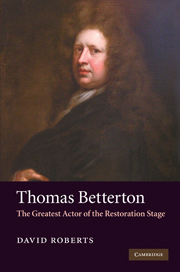Book contents
- Frontmatter
- Dedication
- Contents
- List of illustrations
- Acknowledgements
- Note on dates and texts
- Chapter 1 Introduction
- Chapter 2 Look, my lord, it comes
- Chapter 3 An obstinately shadowy Titan
- Chapter 4 An actor of London: early years, 1635–1659
- Chapter 5 A walk in the park
- Chapter 6 In the Duke’s Company, 1660–1663
- Chapter 7 Equal with the highest
- Chapter 8 Actor management
- Chapter 9 In the Company of the Duke
- Chapter 10 Union
- Chapter 11 Back to the future
- Chapter 12 Books and pictures
- Notes
- Bibliography
- Index
Chapter 1 - Introduction
Published online by Cambridge University Press: 05 July 2014
- Frontmatter
- Dedication
- Contents
- List of illustrations
- Acknowledgements
- Note on dates and texts
- Chapter 1 Introduction
- Chapter 2 Look, my lord, it comes
- Chapter 3 An obstinately shadowy Titan
- Chapter 4 An actor of London: early years, 1635–1659
- Chapter 5 A walk in the park
- Chapter 6 In the Duke’s Company, 1660–1663
- Chapter 7 Equal with the highest
- Chapter 8 Actor management
- Chapter 9 In the Company of the Duke
- Chapter 10 Union
- Chapter 11 Back to the future
- Chapter 12 Books and pictures
- Notes
- Bibliography
- Index
Summary
From the Restoration of Charles II in 1660 to the rise of David Garrick in the 1740s, Thomas Betterton was widely regarded the greatest of English actors. Long after his death in 1710, his name was a by-word for precious commodities: emotional logic over barnstorming effect; substructures of feeling not superficial reactions; the ability to transcend age and physique in search of a character’s passions. Appreciating Betterton as a performer and a person also meant suspending conventional judgements about his profession’s social status, so high were the standards he observed when dealing with fellow actors, managers and writers.
‘Fellow’, because Betterton himself was all those things. He created well over 100 roles, some of which help constitute today’s core Restoration repertory. He was a great exponent of Shakespearean tragic roles, encouraging future generations to conceptualise an English theatre tradition. The most successful theatrical manager of his period, he adapted plays and commissioned much of its best work. An innovator in stage technology, he earned the friendship of major writers and arbiters of taste. Restraint, intelligence and mastery of the repertoire made him, in the richest sense of the term, the first classical actor. Early in his career he received the ultimate accolade from those discerning playgoers, Samuel and Elizabeth Pepys: ‘he is called by us both, the best actor in the world’. For three generations it stuck, and as late as 1756 he was cited as the ‘English Roscius’.
- Type
- Chapter
- Information
- Thomas BettertonThe Greatest Actor of the Restoration Stage, pp. 1 - 6Publisher: Cambridge University PressPrint publication year: 2010



